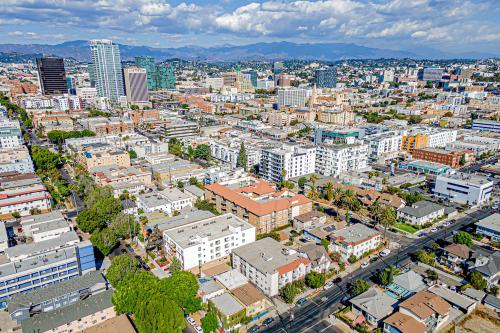Mr. Chairman and members of the Caucus, I am very pleased to be here today to share my views on the reauthorization of the Transportation Equity Act for the 21st Century (TEA-21). My brief comments this afternoon focus on the need for greater local and metropolitan control over transportation spending and how that can result in a more balanced and holistic network which, in turn, can better address transportation challenges and concerns of low income and minority communities all across the nation.
Since the early 1990s, federal transportation law has devolved greater powers to metropolitan areas. In the transportation arena, such devolution has sparked renewed interest in broader metropolitan thinking and action, which is important because these places do indeed matter. They are home to over 80 percent of the nation’s residents, 84 percent of American jobs, 85 percent of the nation’s economic output, and 87 percent of the nation’s black population. In short, metropolitan areas are literally where America lives.
By giving metropolitan areas greater resources and flexibility, federal law has enabled them to tailor transportation solutions to their own distinctive realities, based on locally-defined goals and objectives. These reforms have surely made a difference for communities throughout the nation. Clearly, the federal laws are sound.
And yet, the laws themselves are only part of the picture. Unfortunately, implementation of the statutes has been seriously flawed—and in basic ways unresponsive to metropolitan needs. The impact, therefore, on minority communities has been both profound and disappointing.
The first disappointment is that, after ten years, most states have still not embraced the intent of federal law and devolved sufficient powers and responsibilities to metropolitan areas in order to support local elected leaders and the communities they represent.
Although TEA-21 and its predecessor, the Intermodal Surface Transportation Efficiency Act (ISTEA) were designed to move transportation decision making out of the back rooms and board rooms of the highway establishment, many state departments of transportation (DOTs) still wield considerable formal and informal power, and retain authority over substantial state transportation funds. Such arrangements create an unfavorable climate for the flowering of federal policy reforms and frequently cut against metropolitan interests.
The second disappointment is that many states actually penalize urban and metropolitan areas in the allocation of transportation money. This penalty owes to several biases. The first bias follows from the fact that federal law allocates the vast majority of federal money directly to state DOTs. Only about 6 percent of all federal highway funds are sub-allocated directly to the metropolitan level.
So, while federal transportation spending increased from ISTEA to TEA-21, the share of funds sub-llocated to metropolitan areas actually declined as a share of total highway spending. All told, metropolitan areas make decisions on only about 10 cents of every dollar they generate even though local governments within metropolitan areas own and maintain the vast majority of the transportation infrastructure.
Funding analyses in several states such as Ohio, Colorado, Pennsylvania, Missouri, and Washington show what this means for metropolitan areas. In these states, urban areas act as “donor regions” contributing more in revenues than they receive in allocations from the state or through direct local transfers. So in addition to the donor/donee debate between states, it is important to understand that the issue is also prevalent within many states.
Another urban funding inequity results from the fact that thirty states—including Georgia, Missouri, Pennsylvania, Mississippi, Alabama, and Ohio—restrict the use of their gasoline tax to highway purposes only. This is important for the hearing today particularly because it precludes the use of these state funds for transit which we know is so critical for mobility and job access in metropolitan areas, especially for blacks, who rely on transit almost six times as much as whites and nearly twice as much as other racial and ethnic minorities.
The final disappointment is that TEA-21 failed to improve accountability and performance measures in a way that kept up with its 40-percent spending increase over ISTEA. It is astonishing that unlike other state and local bureaucracies that receive federal funding—state welfare departments, state education departments, local public housing authorities—state transportation departments are held to few performance standards on important factors such as accessibility, mobility, or system preservation.
In conclusion, Mr. Chairman, in order to ensure the equitable distribution of federal transportation dollars in a way that benefits all communities, Congress must boldly go beyond just preserving past reforms and give localities and metropolitan areas greater powers and more tools in exchange for enhanced accountability. To do that, recommendations such as those offered by Representative Eddie Bernice Johnson in H.R. 3611, the Metropolitan Congestion Relief Act, should be embraced—especially those that provide more resources for metropolitan areas from existing federal programs.
But just as importantly, if Congress is serious about making transportation investments equitable, it should establish a new framework for accountability that includes tighter disclosure requirements, improved performance measures, and rewards for exceptional performance. In doing so, Congress will create a transportation system that is more responsive to all citizens and business, both urban and rural, metropolitan and non-metropolitan. The more citizens and businesses inform transportation decisions, the better those decisions will be.
And so Mr. Chairman and members of the Caucus, 2004 need not—and should not—see a “routine” reauthorization of federal transportation law. To the contrary: Enactment of the first major federal transportation bill of the 21st century should become the seminal moment when Washington truly gets transportation policy right for America.
Thank you very much for providing me the opportunity to appear before you today.
The Brookings Institution is committed to quality, independence, and impact.
We are supported by a diverse array of funders. In line with our values and policies, each Brookings publication represents the sole views of its author(s).



Commentary
TestimonyImproving Transportation Decision Making in Low Income and Minority Communities
March 11, 2004